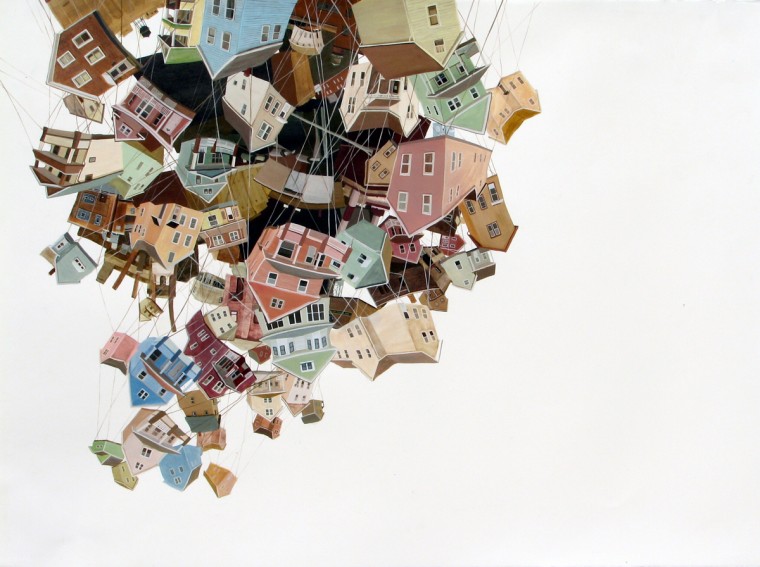 Amy Casey, Dangling, 2008, Acrylic on Paper, 22″ X 30″
Amy Casey, Dangling, 2008, Acrylic on Paper, 22″ X 30″
Nesting
I am tired of beauty
its necessary smallness
scrounging wonder
up like coin
handed over and no change
returned
there’s a robin nesting on the porch pillar
I go on tiptoe to water the window boxes
I hush my breath
still she flies off
leaves her four unruly
children unprotected
pink stab of them
not yet feathered into doubt
I see the wisdom
of taking flight
from loud wanting
but some of us are flightless
two more weeks and they’ll go
read what’s written
on the far face of the wind
beautiful
I’ll say
beautiful
and fluff myself up
sink down on my nest
of unfed unsaid things
the truth of them
a blade I can’t imagine
anywhere but in my body
______________________
Katie Tunning
Review by Jared Pearce
The parallels between the speaker and the bird are wonderful. While the reader can’t know all the details of the speaker’s nest, we certainly can understand how she returns to her own place, both physical and mental, and then, perhaps in envy of the bird, works to survive with that “blade,” that instinct, driving and even hushed.
Review by David Memmott
This is a strong and effective poem. I admired the pacing and the organic form that moves down the page to its own rhythm. Beginning with the abstraction “beauty,” in small and fragile form, the speaker hushing her breath so not to disturb a “robin nesting on the porch pillar.” Loved the strong image of the fledglings in the nest—“pink stab of them/not yet feathered into doubt.” The speaker’s brief identification with the robin, then coming down to earth—“some of us are flightless.” The speaker makes my mind leap to the contrasting image of a dodo bird, squat on its nest “of unfed unsaid things” while the beautiful fledglings take flight reading “what’s written/on the far face of the wind.” The poem is stylistically light as the robin but comes back to the body, and truth is a blade, a pink stab. I admire this poem and its complicated human transcendence that doesn’t always feel like transcendence.
Review by Paul Willis
This poem is full of mystery nested in a verbal precision. Without meaning to, the speaker scares a robin away from its nestlings, then reflects, “I see the wisdom / of taking flight / from loud wanting.” But then the speaker counts herself, regretfully, among the “flightless.” Long after the fledglings leave, she will “sink down on [her] nest / of unfed unsaid things.” In the meantime, she is “tired of beauty,” even though she will call the flight of the baby birds “beautiful.” Something in the speaker needs to fly, needs to be let loose—some truth, some beauty that is authentically hers. And perhaps in the very words of this poem, she has done it.
